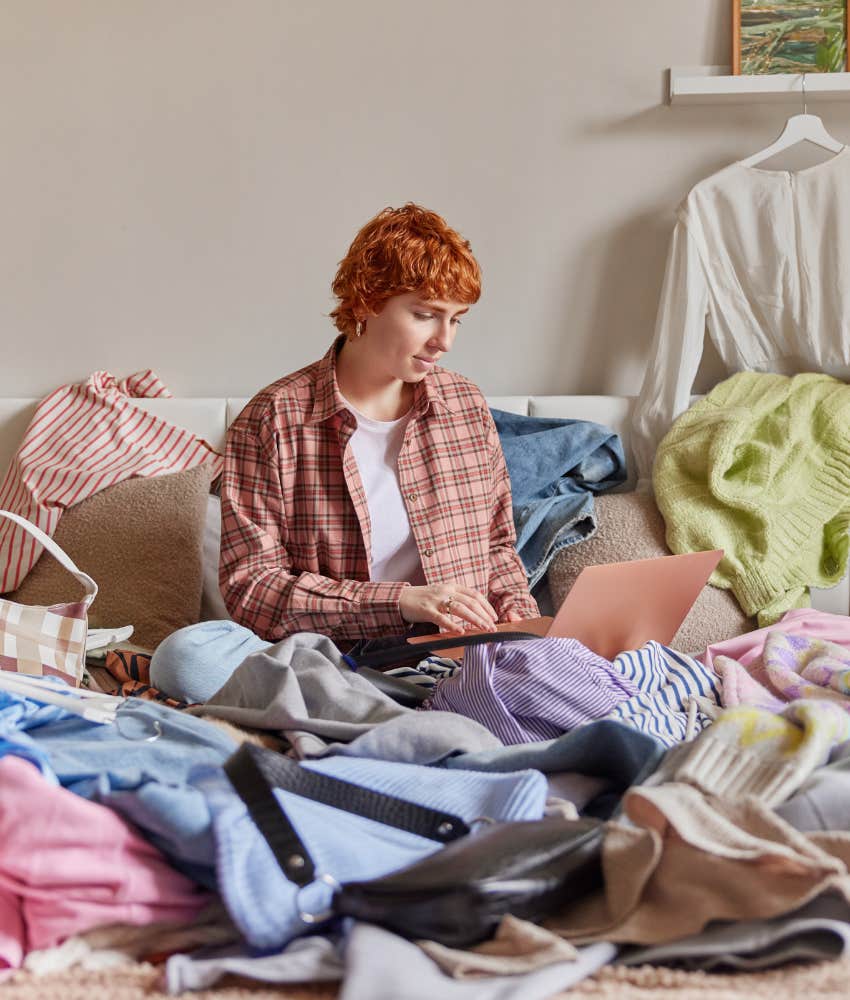5 Gross Habits That Tell People More About Your Hygiene Than You Realize
You might think nobody notices, but these habits reveal more than you want them to.
 MAYA LAB | Canva
MAYA LAB | Canva Your hygiene has a lot to do with your health and well-being, and if you don’t already know it, poor hygiene can hurt you and give off an unintentionally bad impression. Healthy personal habits can help you ward off illnesses and feel good about yourself. Find out the personal hygiene habits that are bad for you — and frankly, the people around you.
Here are five gross habits that tell people more about your hygiene than you realize:
1. Going to bed with makeup on
At the end of a long, exhausting day, it might be tempting to nod off without washing off your makeup. Any makeup artist or skin care professional will tell you this is one of the most egregious hygiene mistakes you can make.
Not washing your face daily can create clogged pores, which not only lead to blackheads and pimples but also uneven skin color due to the overgrowth of skin cells, including damage to your eyes.
And that’s not all: Research on the impact of eye cosmetics supports how neglecting to wash off your mascara, eyeliner, and other eye makeup can do serious damage to your eyes.
Makeup harbors bacteria, which can migrate under your eyelids and lead to styes, inflamed follicles on the lash line, and serious skin infections. Untreated, these infections could eventually lead to blindness.
Most people have no idea they need to clean their makeup brushes and tools. Despite how common the practices are, expired makeup, dirty brushes, not washing your hands, and not following basic hygiene rules can cause bacteria to grow, leading to infections, illnesses, acne, and irritation.
Wash your face before you put your head on the pillow. If you’re wearing an oil-based concealer, you’ll need a solvent-based makeup removal that can emulsify the foundations and lipstick. Use a cleanser around the eyes.
2. Not regularly washing your bedding
 Wayhome Studio via Shutterstock
Wayhome Studio via Shutterstock
The Bureau of Labor Statistics said the average person spends more than eight hours a day lying on their mattress, making it a high-risk infection zone if not properly cared for.
You shed 500 million skin cells a day, many of which slough off while you roll around in bed sleeping. Also, about 1.5 million house dust mites settle in your bed each night, and they leave their marks in the form of welts on your neck, face, and arms, which may cause breathing issues.
Taken together, dust mites, dead skin cells, sweat, and saliva in your bedsheet and pillowcase can turn your bed into a petri dish where germs grow.
A lot of people don’t wash their sheets often enough, so it’s important to point out the critical health risks associated with such poor hygiene practices. No matter how clean you are as a person, your sheets are teeming with all kinds of germs and debris.
When your sheets stay unwashed for long periods of time, fungi, bacteria, and other debris, including dust mites, accumulate dramatically. These allergens enter the body through your nose, mouth, skin, or eyes. This can lead to allergies and infections, including a stuffy nose, inflamed airways, and itchiness. It can even aggravate asthma.
In the worst-case scenario, as shown in a 2008 study, unwashed bed sheets will lead to a staph infection. If a staph infection makes its way into the bloodstream, it can escalate to a more severe condition like sepsis or toxic shock syndrome, which could be fatal.
Wash your bedding with hot water. Afterward, toss it into the dryer. The dryer’s heat can kill some germs that survive the wash. If it’s safe for the color, use a germ-killer like bleach on your sheets, especially if you’re cleaning up after a sick person.
3. Not regularly cleaning your bras or underwear
How often do you need to wash your bras and underwear? While there’s no exact science to this question, a Cleveland Clinic dermatologist says you should wash them after every two to three wears, as a general rule.
Senior scientific communications manager of Procter & Gamble, Mary Begovic Johnson, said in an interview, to avoid wearing the same bra more than three to five times in a row.
The reason is that your body releases sweat, dirt, oil, bacteria, sunscreen, yeast, fungi, and lots of microbiota into your bra and undergarments. So, it’s a bad habit to go on wearing the same bra or pants for days without washing, as this can lead to stains and persistent odors as well as skin irritation, rashes, or local skin infections.
Sweaty undergarments are one of the most common causes of body acne. Because bras are so tight and close to the skin, all the bacteria that have built up over time can easily cause friction.
4. Sharing your toothbrush, razor, or hairbrush
 PeopleImages.com - Yuri A via Shutterstock
PeopleImages.com - Yuri A via Shutterstock
Your personal grooming products are a perfect example of things in which sharing isn't virtuous. Poor oral hygiene habits are bad enough, and the last thing you want is the bacteria from someone else’s mouth infecting yours.
And the spread of infections and diseases on a massive scale is what can happen when you use someone else’s toothbrush, razor, or hairbrush. Different types of bacteria reside in your mouth. One of such organisms that lives in almost everyone’s mouth and can be shared with a toothbrush is Streptococcus mutans.
When this bacteria digests the sugars in your mouth, it creates acid strong enough to erode your enamel, causing cavities, which is extremely contagious. Again, if you’re sharing your toothbrush, you could be sharing blood and saliva as well. This also exposes you to blood-borne viruses such as herpes and hepatitis.
Meanwhile, sharing razors isn’t much better, as it not only spreads skin infections like staph, but can transmit viruses like hepatitis and HIV. Sharing hair brushes can put you at risk for lice and skin rashes.
5. Walking barefoot in a public restroom
Public restrooms are a necessary part of life unless you’re a person who never leaves your home. But walking barefoot in a public bathroom or restroom is a bad habit and is not good for your hygiene.
The sweat, hair, and urine that collect on the floor can breed bacteria, fungus, and mold. And you easily pick up ringworm, athlete’s foot, nail fungus, and other diseases by walking in there barefoot.
What’s worse? Research discussed how these diseases are very difficult to treat. For example, ringworm (a fungal infection of the skin) can be treated with topical antifungals, but athlete’s foot can be far more persistent.
In the worst-case scenario, an athlete’s foot can cause a secondary infection that can lead to fevers and complications of the lymphatic system. So, while you may need to use a public restroom, you need to take care that you don’t walk without putting on a flip-flop, as it increases your risk of contracting infections.
Your personal hygiene is important if you want to stay healthy. Exposing yourself to bacteria, fungi, and other harmful microorganisms by engaging in poor habits can make you vulnerable to disease attacks.
Victor Mong is a researcher writing about self-improvement, psychology, mental health, and productivity.

